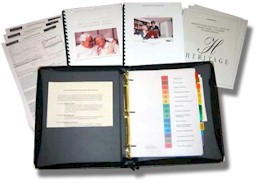Joint Tenancy and Capital Gains
One of the comments I often hear from Seniors is “I will put my children on my mortgage as joint tenant with me so they will get it without Probate when I die". Well, it is true that Probate can be avoided that way but it raises all kinds of other problems. Consider this....
Joint Tenancy with your children can be dangerous. You should be careful when trying to avoid Probate by sharing ownership of your assets with your children as joint tenants. Setting up Joint Tenancy with your children cannot avoid taxes that were originally due, because the practice is so common that this situation is one of the first loop holes looked at by the Internal Revenue Service. Entering into Joint Tenancy with children to avoid Probate creates a whole new set of problems.
1. The children's share of the property becomes subject to the children's creditors, including people who win lawsuits and legal judgments against them. In Joint Tenancy you could lose your home to a lawsuit against your child.
2. The children have an equal right to the enjoyment of the property and although unthinkable, your children could take your property from you.
They may move in or create such untenable conditions that the parents are forced to move out or sell the property. If one of the children were unable to pay his or her debts or were involved in an accident, for example, and incurred a lawsuit or judgment rendered against him or her, the parents' assets held in Joint Tenancy with the child would be subject to the child's creditors. Therefore, the parents could well lose their home (or other assets) in order to satisfy their child's creditors or judgments.
Joint Tenancy does not totally eliminate probate
Joint Tenancy does not entirely eliminate the process of probate. Even though Joint Tenancy can avoid probate on the first spouse to die, the entire estate must go through Probate upon the death of the second spouse. Having the entire estate go through probate upon the death of the second spouse is one of the strongest arguments against Joint Tenancy. At best, Joint Tenancy simply delays the inevitable probate cost on the second to die. It seems logical that, if probate is eventually certain (when the assets are held in Joint Tenancy) and if there is a better way to avoid probate entirely...and there definitely is a better way, then the time to act is now and a Living Trust is the answer.
Gifted property forfeits stepped-up valuation
Another reason for parents not going into Joint Tenancy with one or more of their children is that they effectively gift to them that share of the parents' asset. When the child receives the parents' share of the asset as a gift, the value of the share is received at the parents' original cost basis, thus losing the tax benefit of stepped-up valuation.
Avoiding capital gains in Joint Tenancy
When real estate or other property is purchased, its purchase price is considered to be its "basis". When that real estate or property is finally sold, its sale price is its true market value, and the gain between its purchase price (basis) and its sale price is the portion of its value that you pay Capital Gains Tax on. In a situation where a married couple owns a home in Joint Tenancy and one spouse dies, the surviving spouse is deemed to own one-half of the value of the property. The deceased spouse owns the other half of the value of the property, and if there is a Capital Gain subject to Capital Gains taxes, the estate of the deceased must pay Capital Gains tax on its half of the gain. A home purchased many years before which has appreciated by $200,000 or $300,000 can incur a sizable Capital Gains tax if it is not in a Living Trust.
Example: If a home were purchased by a couple in 1960 for $50,000 and today its fair market value is $300,000, there would be a taxable gain of $250,000 if it were sold today. Since the deceased spouse's estate takes one-half of the property value, $25,000 (one-half the original purchase price) and $125,000 (one-half of the gain at death) is attributed to the deceased's estate. Capital Gains Tax becomes due and payable in the amount of 18-20 percent of the $125,000 Capital Gain, or $25,000 in taxes at the sale of the home. Taxes could be more if the home is not sold for some time and the gain increases. Conversely, taxes would be less if the gain in the value of the house decreased before its sale.
Joint Tenancy & Capital Gains Taxes
A Living Trust eliminates these problems completely, "stepping up the cost basis" on the home. That is to say, the basis on the home is "stepped up" to the current market value at the time of death and the gain is wiped out; therefore, there are no Capital Gains Taxes on the home. This works only where one of the spouses dies. Of course, Probate is completely avoided in the process, making Joint Tenancy completely unnecessary. By simply making the Living Trust the owner of the property, Probate is eliminated and all Capital Gains and Gift Taxes are completely eliminated at death.
Doesn’t it make sense to just avoid all of those potential problems and solve the problem now while you can. The staff at Heritage would be happy to discuss this further with you. Just give us a call at 888-437-8778 toll free.
You can access more information on the Living Trust by visiting the Heritage website at
Until Next Time....
 Post a Comment → Posted on
Post a Comment → Posted on  Saturday, March 30, 2013 at 03:01PM
Saturday, March 30, 2013 at 03:01PM 

Reader Comments